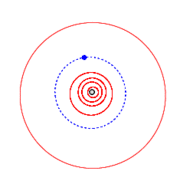9968 Serpe
9968 Serpe, provisional designation 1992 JS2, is an asteroid from the middle regions of the asteroid belt, approximately 12 kilometers in diameter.
 Orbits of Serpe (blue), the inner planets and Jupiter (outermost) | |
| Discovery [1] | |
|---|---|
| Discovered by | H. Debehogne |
| Discovery site | La Silla Obs. |
| Discovery date | 4 May 1992 |
| Designations | |
| (9968) Serpe | |
Named after | Jean Serpe (Belgian physicist)[2] |
| 1992 JS2 · 1977 VT 1985 SC2 · 1988 KR1 | |
| main-belt · (middle) | |
| Orbital characteristics [1] | |
| Epoch 4 September 2017 (JD 2458000.5) | |
| Uncertainty parameter 0 | |
| Observation arc | 39.56 yr (14,451 days) |
| Aphelion | 2.6974 AU |
| Perihelion | 2.4354 AU |
| 2.5664 AU | |
| Eccentricity | 0.0510 |
| 4.11 yr (1,502 days) | |
| 346.96° | |
| 0° 14m 22.92s / day | |
| Inclination | 12.993° |
| 213.10° | |
| 78.256° | |
| Physical characteristics | |
| Dimensions | 12.355±0.453 km[3] |
| 0.088±0.011[3] | |
| 13.0[1] | |
This asteroid was discovered on 4 May 1992, by Belgian astronomer Henri Debehogne at ESO's La Silla Observatory in northern Chile. It was named after Belgian physicist Jean Serpe.[2]
Orbit and classification
Serpe orbits the Sun in the middle main-belt at a distance of 2.4–2.7 AU once every 4 years and 1 month (1,502 days). Its orbit has an eccentricity of 0.05 and an inclination of 13° with respect to the ecliptic.[1] In 1977, it was first observed as 1977 VT at Cerro El Roble Station in Argentina, extending the body's observation arc by 15 years prior to its official discovery at La Silla.[2]
Physical characteristics
Diameter and albedo
According to the survey carried out by NASA's Wide-field Infrared Survey Explorer with its subsequent NEOWISE mission, the asteroid measures 12.355 kilometers in diameter and its surface has an albedo of 0.088.[3]
Rotation period
As of 2017, no rotational lightcurve has been obtained of Serpe. The body's rotation period and shape, as well as its spectral type remain unknown.[1][4]
Naming
This minor planet was named after Belgian Jean Nicolas François Jules Serpe (1914–2001), theoretical-physicist, professor at Liège University and member of the RASAB.[2] The official naming citation was published by the Minor Planet Center on 17 May 2011 (M.P.C. 75102).[5]
References
- "JPL Small-Body Database Browser: 9968 Serpe (1992 JS2)" (2017-06-05 last obs.). Jet Propulsion Laboratory. Retrieved 22 June 2017.
- "9968 Serpe (1992 JS2)". Minor Planet Center. Retrieved 9 March 2017.
- Masiero, Joseph R.; Mainzer, A. K.; Grav, T.; Bauer, J. M.; Cutri, R. M.; Nugent, C.; Cabrera, M. S. (November 2012). "Preliminary Analysis of WISE/NEOWISE 3-Band Cryogenic and Post-cryogenic Observations of Main Belt Asteroids". The Astrophysical Journal Letters. 759 (1): 5. arXiv:1209.5794. Bibcode:2012ApJ...759L...8M. doi:10.1088/2041-8205/759/1/L8. Retrieved 23 August 2016.
- "LCDB Data for (9968) Serpe". Asteroid Lightcurve Database (LCDB). Retrieved 9 April 2017.
- "MPC/MPO/MPS Archive". Minor Planet Center. Retrieved 9 March 2017.
External links
- Asteroid Lightcurve Database (LCDB), query form (info)
- Dictionary of Minor Planet Names, Google books
- Asteroids and comets rotation curves, CdR – Observatoire de Genève, Raoul Behrend
- Discovery Circumstances: Numbered Minor Planets (5001)-(10000) – Minor Planet Center
- 9968 Serpe at AstDyS-2, Asteroids—Dynamic Site
- 9968 Serpe at the JPL Small-Body Database
